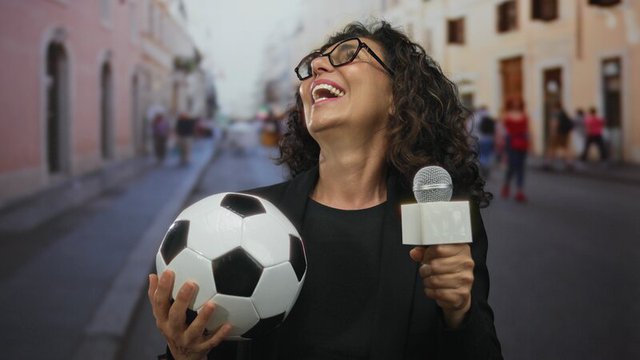
Skills to be a sports journalist
Nov. 17, 2025

Sports journalism is one of the most exciting and fast-paced areas of media. It combines passion for sport with the ability to communicate stories that inspire, inform, and connect audiences worldwide. To stand out in this competitive field, aspiring professionals need a mix of technical, analytical, and creative skills.
At Escuela Universitaria Real Madrid - Universidad Europea, the Master in Sports Journalism and Communication prepares students to thrive in this dynamic industry. The programme blends hands-on training with expert-led teaching, helping future journalists develop the confidence and versatility to report on sport across multiple platforms.
What every sports journalist needs
In this section, we’ll explore the core skills that define successful sports journalists embarking on their careers and why each one is essential for thriving in today’s fast-evolving media landscape. From mastering communication to understanding digital tools, these abilities shape how journalists tell stories, connect with audiences, and influence the world of sports.
Excellent communication and writing skills
At the heart of sports journalism lies clear and engaging communication. Whether you’re writing an article, presenting live commentary, or conducting an interview, your ability to express ideas with precision and emotion matters.
Sports journalists must:
- Write concisely under tight deadlines.
- Use a tone that connects with diverse audiences.
- Adapt their writing style for print, broadcast, and digital media.
Strong storytelling helps transform facts and statistics into compelling narratives — making even the most complex matches or controversies accessible and memorable.
Deep knowledge of sports and current events
A successful sports journalist understands not only the rules of the game but also the context behind every story. This means staying informed about athletes, teams, tournaments, and the socio-economic issues that shape sports globally.
In-depth knowledge allows journalists to provide richer insights, analyse strategies, and identify trends. At Universidad Europea, students gain both journalistic expertise and a comprehensive understanding of the sports industry, ensuring their reporting is accurate, relevant, and impactful.
Research and analytical skills
Behind every great sports story is solid research. Journalists need to gather and verify information from multiple sources, including statistics, interviews, and live data, to present credible and balanced content.
Analytical skills also help in:
- Evaluating team performance.
- Interpreting data and metrics.
- Understanding the broader implications of sports events (economically, socially, and politically).
With the rise of data-driven journalism, knowing how to interpret statistics and use analytical tools is more valuable than ever.
Multimedia and digital competence
Modern sports journalism extends far beyond newspapers and television. Today’s professionals must master digital storytelling, combining text, audio, video, and social media to reach audiences wherever they are.
Key digital skills include:
- Filming and editing videos for online platforms.
- Using social media for live reporting and audience engagement.
- Podcasting and creating interactive multimedia content.
At Universidad Europea, students have access to state-of-the-art media facilities, allowing them to practice real-world journalism from day one.
Adaptability, ethics, and passion
Finally, the best sports journalists are adaptable, ethical, and deeply passionate about their work. The media landscape evolves quickly, and professionals must stay flexible and open to new technologies and storytelling formats.
Equally important is maintaining journalistic integrity — verifying facts, respecting privacy, and reporting responsibly. Passion for sports fuels persistence, creativity, and the drive to cover every story with enthusiasm and authenticity.
Conclusion: turning passion into profession
Sports journalism is about more than reporting results. It’s about telling the stories behind the games, the athletes, and the emotions that move millions. With the right skills and mindset, you can turn your love for sport into a rewarding and influential career.
In summary:
- Strong communication and research skills are essential.
- Digital media and storytelling tools are key to success.
- Passion, ethics, and adaptability define great sports journalists.
If you’re ready to turn your passion for sport into a profession, explore the Master in Sports Journalism and Communication, just one of our many sports masters at Universidad Europea and start building your future in the global sports media industry.